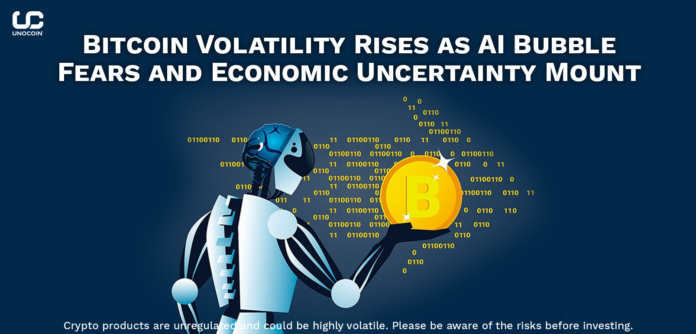Bitcoin has recently seen a significant drop in price due to growing global economic challenges, fears of a potential AI bubble, and escalating geopolitical tensions. As the world grapples with a potential recession, investors are moving away from riskier assets like bitcoin and toward safer options like government bonds and cash. This shift highlights how external factors outside the crypto space increasingly influence Bitcoin’s price movement.
Global economic outlook and Bitcoin price decline
The weakened global economy plays a key role in the recent correction in the price of Bitcoin. On September 30, the cost of Bitcoin fell 4.1%, retesting the $63,500 support level, and erasing the gains of the previous five days. While liquidations during this downturn were modest at less than $40 million, it signals growing concern among investors as global economic problems deepen.
In the United States, the Federal Reserve’s outlook for inflation, employment and economic growth is under intense scrutiny. Any signs of weakness in the services or manufacturing sectors could further dampen investor confidence with potential impacts on Bitcoin. Given Bitcoin’s established correlation with traditional markets, especially stocks, a downturn in the US economy could likely cause Bitcoin prices to fall even further.
Adding to the pressure are concerns about a potential bubble forming in the artificial intelligence (AI) sector. While investment in AI is skyrocketing, some experts warn that overvaluation in AI-related businesses could lead to a significant market correction. If this AI bubble bursts, panic selling may develop in other sectors, including cryptocurrencies, and further affect the price of Bitcoin.
AI Market Volatility and Its Impact on Bitcoin
A significant source of concern in the market revolves around fears of the bursting of the AI bubble. Mike Fishbein, a prominent voice in AI, highlighted the risk posed by the exorbitant cost of AI subscriptions, despite the falling operating costs of large language models (LLMs) such as ChatGPT, Gemini and Copilot. As companies charge high fees for AI services, there is concern that customers will eventually push away, leading to a decline in AI revenue.
If the AI sector were to face a downturn, the ripple effects could spread to the tech market as a whole, including cryptocurrencies. Bitcoin often considered a high-risk investment, could see further downward pressure if investors decide to limit their exposure to technology and other speculative assets. As market sentiment becomes more cautious, Bitcoin’s vulnerability to market-wide selloffs increases, leaving it vulnerable to further price declines.
European economic struggles and tensions in the Middle East
Europe’s economic problems are another major factor contributing to bitcoin price volatility. Germany, the largest economy in Europe, is facing significant stagnation. Automakers such as Stellantis and Volkswagen have cut their profit outlook and are even considering closing factories, a scenario that hasn’t happened in decades. With weak demand from China and concerns about energy costs, the European economy is showing clear signs of fragility.
Geopolitical tensions in the Middle East also contribute to market instability. Recent conflicts, particularly in Lebanon, have escalated concerns about oil supplies and rising prices. Higher oil prices could create additional inflationary pressures that would make it more difficult for central banks, especially the US Federal Reserve, to cut interest rates. In such a scenario, investors could flock to safe-haven assets like gold and bonds, leaving Bitcoin in a precarious position.
Bitcoin Short-Term Outlook: Movement in an Uncertain Market
While Bitcoin’s long-term potential remains promising, its short-term outlook is shrouded in considerable uncertainty. With global recession concerns, AI market volatility, and geopolitical concerns causing market volatility, Bitcoin is likely to be under constant pressure in the short term. Traders are becoming more cautious and many are choosing to reduce their exposure to riskier assets.
But bitcoin’s fundamentals—such as its role as a decentralized, inflation-proof asset—remain strong. While external factors are currently affecting its price, Bitcoin’s long-term growth potential as a store of value and its use in decentralized finance (DeFi) continues to attract interest from both institutional and retail investors. Despite short-term volatility, bitcoin’s resilience in the face of global uncertainty is likely to strengthen its position in the future.
Conclusion: Riding the waves of turbulence in the global market
The recent drop in the price of Bitcoin is a stark reminder of how intertwined the global economy has become with the cryptocurrency market. Recession fears, speculation of an AI market correction and geopolitical tensions weigh heavily on Bitcoin, highlighting its sensitivity to broader market changes. While the long-term outlook for Bitcoin remains solid, the short-term environment is full of volatility and uncertainty.
Investors must carefully evaluate macroeconomic conditions, global market trends, and the evolving nature of the crypto space. Although the price of Bitcoin may continue to face downward pressure in the short term, its potential as a transformative financial asset remains undiminished. In this volatile environment, the key to navigating bitcoin investing lies in understanding the broader market forces at play and preparing for potential short-term fluctuations as the global economy changes.
Please find the list of authentic Unocoin accounts for all your queries below:
- Twitter: https://twitter.com/Unocoin
- Instagram: https://www.instagram.com/unocoin/
- Facebook: https://www.facebook.com/unocoin/
- LinkedIn: https://in.linkedin.com/company/unocoin
- YouTube Channel: https://www.youtube.com/c/Unocoin/videos
- Newsletter: https://medium.com/subscribe/@Unocoin_growth
- Blogs: https://blog.unocoin.com
- Telegram Group: https://t.me/Unocoin_Group
- Telegram Channel: https://t.me/+fasQhTKBsfA5N2Zl
- Telegram: https://t.me/UnocoinSupport_Bot
- E-mail id: [email protected]
- Contact details: 7788978910 (09:30 AM IST – 06:30 PM, Mon-Sat)
- App store link: https://apps.apple.com/us/app/unocoin/id1030422972?ls=1
- Playstore link: https://play.google.com/store/apps/details?id=com.unocoin.unocoinwallet
Disclaimer: Crypto products are unregulated as of this date in India. They could be highly volatile. At Unocoin, we understand that there is a need to protect consumer interests as this form of trading and investment has risks that consumers may not be aware of. To ensure that consumers who deal in crypto products are not misled, they are advised to DYOR (Do Your Own Research).




